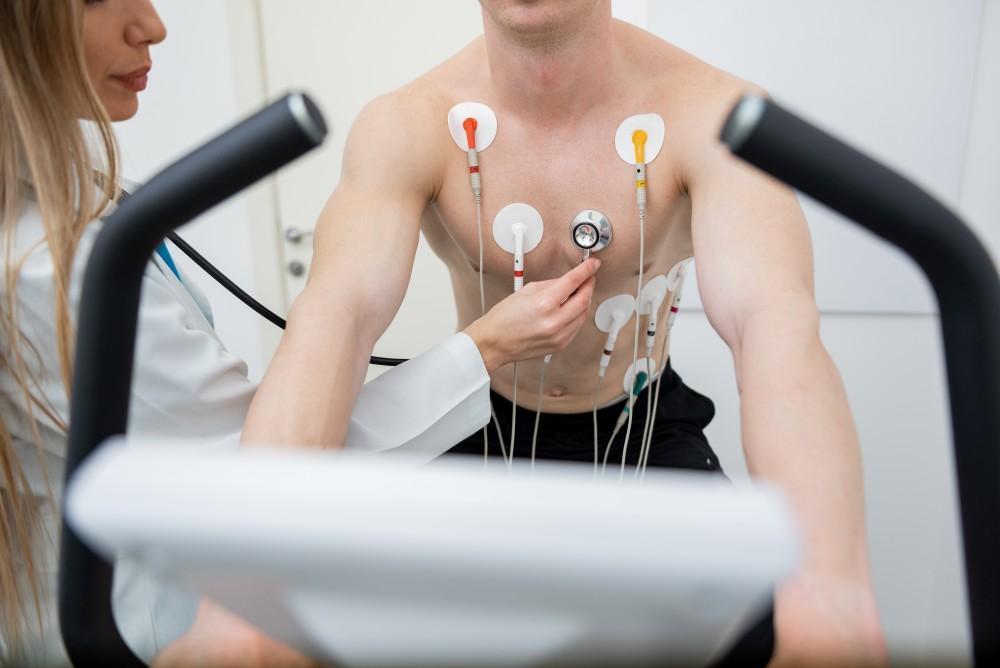
All About Stress EKGs

Stress tests go by many names: cardiac stress test, stress EKG, exercise test, and exercise stress test. Regardless of what name you call it, this test shows how hard your heart works during physical activity.
Dr. Henock Saint-Jaques may use stress electrocardiograms (EKGs) to help diagnose coronary artery disease, to monitor the progress of current treatments, or to determine the best time to schedule surgeries and/or transplants. If you have questions about your upcoming stress test, we encourage you to reach out. We’re always happy to answer questions. In the meantime, you can learn more about stress EKGs in this guide.
Stress test basics
The overall premise of stress is to measure how well your blood flows through your heart. There are two components of a stress test:
- The event that stresses your heart: This can be exercise or a medicine that makes your heart beat as if you were exercising
- A diagnostic test that assesses your heart health: In this case, an EKG that records your heart’s electrical activity
Because your heart pumps harder during exercise, this test can highlight problems that may be harder to detect when your heart is at rest.
Other tests can also be combined with your stress test, such as nuclear stress tests and stress echocardiography.
Preparing for a stress EKG
Before you arrive for your stress EKG, Dr. Saint-Jacques reviews any special instructions you may need, such as if you need to adjust any of your medications. Here are a few additional ways to prepare for a stress test:
- Wear comfortable athletic shoes and blister-resistant socks
- Wear athletic clothing, suitable for walking on a treadmill or using a stationary bike
- Avoid smoking or drinking caffeine
- Bring a hand towel or wear a sweatband
It’s normal to feel a little apprehensive before a test, especially one with the word “stress” in the name of it. Remember, the goal is to measure how blood flows, and the exercise portion of the test is only about 10-15 minutes.
What happens during a stress test?
The specific details of your stress test may vary depending on what type of stress test you have. If you are undergoing an exercise stress test, you will ride on a stationary bike or walk on a treadmill. The entire exercise portion lasts anywhere from 5-15 minutes, with the speed, incline, or intensity increasing every few minutes. While you’re exercising, we monitor your blood pressure, heart rhythm, and breathing. The exercise portion is completed either when your heart rate reaches the target set by Dr. Saint-Jacque or if you’re too fatigued to continue. Once the exercise portion is completed, you lay down while the EKG monitors your heart as it returns to its resting rate.
If you can’t exercise for medical reasons, you won’t have to complete the exercise portion of the test. Instead, you receive an intravenous medication that increases blood flow to your heart. This stimulates the effects of exercise on your heart. As with an exercise stress test, we continue to monitor your heart rate throughout the test and then as your heart rate returns to its resting rate.
Do stress tests hurt?
An exercise stress test isn’t painful. You may feel a little tired after you exercise, but it doesn’t hurt. The electrodes of the EKG stick on your skin. There’s no need for any needles or pricks. Electrodes (small metal tabs) are placed on your chest with small sticky papers, and they record your heart's electrical signals, which show up as waves on a graph. The electrodes don’t emit any sort of painful shock, but you may feel a little tug when the sticky papers are removed.
That being said, if you need to receive the medication during your stress EKG, you may feel a slight pinch when the medication is delivered.
What happens after a stress test?
Once your test is done, Dr. Saint-Jacques reviews the results of your EKG. EKG readings can provide information about your heart rate and rhythm, if your heart is receiving enough oxygen, and if you have any other structural abnormalities. Depending on the results of your stress test and the reason you were sent for a stress test, Dr. Saint-Jacques may confirm a diagnosis, make any necessary adjustments to your treatment plan, or determine the best time to schedule surgeries.
Do you have questions about an upcoming stress EKG at our Madison Avenue office? You can reach us at 646-381-2181. Alternatively, you can book an appointment online easily 24/7.
You Might Also Enjoy...


Is It Possible to Lower My Blood Pressure Naturally or Do I Need Medicine?

What You Can Do Now to Prevent a Stroke Later in Life

3 Noninvasive Tests That Measure the Health of Your Heart

What Can I Do About My Varicose Veins?


